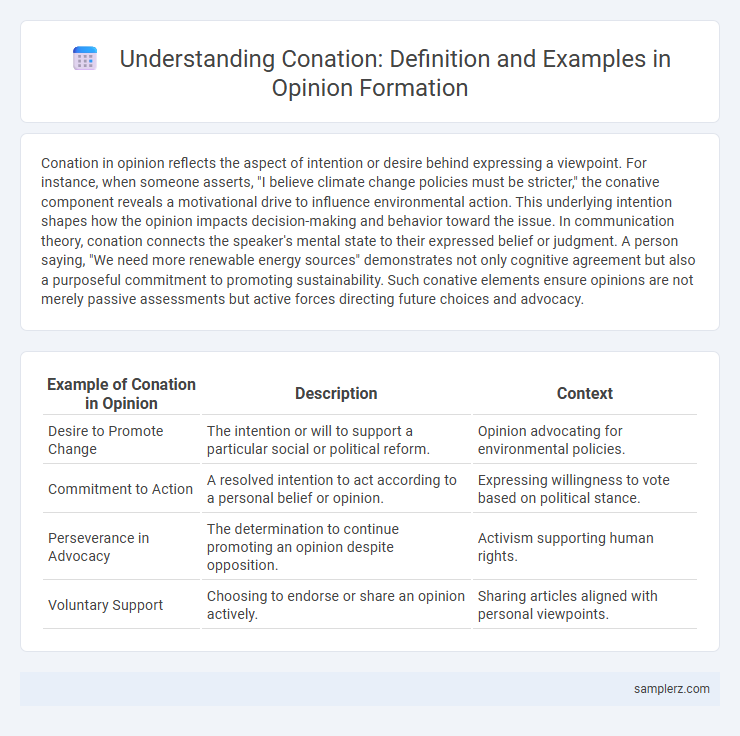Conation in opinion reflects the aspect of intention or desire behind expressing a viewpoint. For instance, when someone asserts, "I believe climate change policies must be stricter," the conative component reveals a motivational drive to influence environmental action. This underlying intention shapes how the opinion impacts decision-making and behavior toward the issue. In communication theory, conation connects the speaker's mental state to their expressed belief or judgment. A person saying, "We need more renewable energy sources" demonstrates not only cognitive agreement but also a purposeful commitment to promoting sustainability. Such conative elements ensure opinions are not merely passive assessments but active forces directing future choices and advocacy.
Table of Comparison
| Example of Conation in Opinion | Description | Context |
|---|---|---|
| Desire to Promote Change | The intention or will to support a particular social or political reform. | Opinion advocating for environmental policies. |
| Commitment to Action | A resolved intention to act according to a personal belief or opinion. | Expressing willingness to vote based on political stance. |
| Perseverance in Advocacy | The determination to continue promoting an opinion despite opposition. | Activism supporting human rights. |
| Voluntary Support | Choosing to endorse or share an opinion actively. | Sharing articles aligned with personal viewpoints. |
Understanding Conation in Forming Opinions
Conation plays a crucial role in forming opinions by driving individuals to actively seek information and evaluate perspectives based on personal goals and motivations. This purposeful effort influences how opinions are shaped, reflecting not just cognitive processes but also the will to act on beliefs. Understanding conation highlights the dynamic interaction between intention and judgment in opinion formation.
The Role of Willpower in Shaping Beliefs
Willpower plays a critical role in shaping beliefs by enabling individuals to consciously choose and reinforce certain viewpoints despite external pressures or cognitive biases. This deliberate effort to align thoughts with personal values exemplifies conation, where intentional action drives belief formation and persistence. Consequently, strong willpower can lead to more consistent and deeply held opinions, reflecting the active role of conative processes in mental frameworks.
How Intent Guides Personal Opinions
Intent shapes personal opinions by directing the underlying motivation behind beliefs and judgments. Conative processes involve the active effort individuals exert to align opinions with their goals, values, and desires. This intentional drive influences how information is interpreted and prioritized, reinforcing opinions that serve personal purposes.
Conative Actions Behind Strong Viewpoints
Conative actions behind strong viewpoints often manifest as active efforts to persuade others, such as advocating passionately or mobilizing support for a cause. These actions reflect intentional behavior driven by motivation to influence opinions and promote specific beliefs. Understanding conation reveals how determination shapes the expression and reinforcement of deeply held perspectives.
Motivation and Opinion: A Conative Perspective
Motivation significantly influences opinion formation by driving individuals to seek information that aligns with their goals and desires, exemplifying conation as the proactive mental process behind opinion development. This conative perspective highlights how motivation shapes not only what opinions are held but also the intensity and persistence with which they are maintained. Understanding the role of conation in opinion reveals the dynamic interplay between cognitive evaluation and motivational forces in shaping personal and collective beliefs.
Real-Life Examples of Conation in Debates
In debates, conation manifests as the persistent drive to persuade and defend a viewpoint despite opposition or challenging evidence. For example, a debater repeatedly refines arguments and employs strategic rhetoric to influence the audience's decision-making process. This enduring motivation to act on beliefs highlights the role of conation in shaping effective communication and decision outcomes.
Intentional Choice in Opinion Formation
Intentional choice in opinion formation demonstrates conation by actively selecting beliefs aligned with personal goals and values. This deliberate mental effort shapes opinions through the purposeful evaluation of information rather than passive acceptance. The cognitive drive behind this selection underscores how conation influences the formation and reinforcement of opinions.
Conation vs. Cognition in Expressing Opinions
Conation drives the motivation behind expressing opinions, reflecting an individual's will to influence or persuade, unlike cognition, which involves the rational processing of information. While cognition shapes the understanding and evaluation of facts, conation energizes the commitment and emotional investment in asserting those opinions. Recognizing the interplay between conation and cognition clarifies why people hold opinions with varying degrees of intensity and conviction.
Case Studies: Conative Influences on Public Opinion
Case studies reveal how conative factors drive shifts in public opinion by highlighting emotional appeals and behavioral intentions embedded in political campaigns. The 2020 U.S. presidential election demonstrated conative influence through targeted messaging that motivated voter turnout and engagement. Analysis of social media data confirms that conative cues like urgency and personal relevance significantly impact opinion formation and decision-making.
Strategies to Harness Conation in Persuasive Writing
Harnessing conation in persuasive writing involves strategically appealing to readers' willpower and motivation to inspire action. Techniques include crafting compelling calls to action, using strong verbs that evoke determination, and aligning arguments with the audience's goals or desires. This approach enhances engagement by directly targeting the reader's drive to implement the writer's suggestions.

example of conation in opinion Infographic
 samplerz.com
samplerz.com